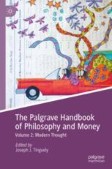Search
Search Results
-
Anscombe on Money, Debt, and Usury
G. E. M. Anscombe gave a lecture in 1970 on the shift in attitudes toward usury between medieval and modern times. Over the course of this lecture...
-
Kant and Anscombe: Two Contrasting Views on Aristotle’s ‘Virtue’
The paper attempts to discuss two contrasting views on Aristotle’s notion of ‘virtue’ advocated by Immanuel Kant and G. E. M. Anscombe. Kant...
-
Anscombe on ‘I’
In “The First Person”, G. E. M. Anscombe argues against the common-sense view that ‘I’ is a referring expression. My aim in this discussion is to...
-
Elizabeth Anscombe on Rationalism
Elizabeth Anscombe’s “Modern Moral Philosophy” is rightly famous. In it, she argues explicitly for several theses and implicitly for several more;...
-
Anscombe and Intentional Agency Incompatibilism (for human and animal agents)
In “Causality and Determination”, Anscombe stressed that, in her view, physical determinism and free action were incompatible. As the relevant...
-
“Let’s build an Anscombe box”: assessing Anscombe’s rebuttal of the statistics objection against indeterminism-based free agency
Towards the end of her famous 1971 paper “Causality and Determination”, Elizabeth Anscombe discusses the controversial idea that “ ‘physical...

-
Elizabeth Anscombe on Action Individuation (Or Why We Do Not Need a Theory of Action Individuation)
At the end of her enquiry on intention, Anscombe states that ‘[t]he term “intentional” has reference to a form of description of events’. This...
-
The Philosophy and History of the Moral ‘Ought’: Some of Anscombe’s Objections
According to G.E.M Anscombe’s paper ‘Modern Moral Philosophy’, modern moral philosophy has introduced a spurious concept of moral obligation, and has...
-
“Ludwig Wittgenstein”
Presented here is the transcript of a BBC radio broadcast by Elizabeth Anscombe that was recorded in May 1953—the month when Wittgenstein’s...
-
Striving, Willing, and Acting in Pfänder and Husserl
This article presents a mutual critique of the analytic and phenomenological theory of action. The first perspective focuses on the standard approach...
-
Why Aristotle Isn’t a Virtue Ethicist. Living Well and Virtuously in Aristotelian and Contemporary Aretaic Ethics
Drawing on Anscombe, in this essay I argue that we should not take Aristotle to be a moral philosopher, nor a virtue ethicist. This is because...
-
Causality, determination and necessitation in free human action
Human freedom is often characterised as a unique power of self-determination. Accordingly, free human action is often thought to be determined by the...
-
Editorial Approaches to Wittgenstein’s Nachlass
Building on the unpublished correspondence between Ludwig Wittgenstein’s literary executors Rush Rhees, Elizabeth Anscombe and Georg Henrik von...
-
What does causality have to do with necessity?
In her ‘Causality and Determination’, Anscombe argues for the strong thesis that despite centuries of philosophical assumption to the contrary, the...
-
Why are Actions but not Emotions Done Intentionally, if both are Reason-Responsive Embodied Processes?
Emotions, like actions, this paper argues, are typically embodied processes that are responsive to reasons, where these reasons connect closely with...
-
On Certainty on the Foundations of History as a Discipline
Wittgenstein had little to say directly on philosophy of history. But some pertinent remarks in On Certainty have received little attention, apart...
-
Wittgenstein and His Literary Executors
Rush Rhees, Georg Henrik von Wright and Elizabeth Anscombe are well known as the literary executors who made Ludwig Wittgenstein’s later philosophy...
-
Causality and determination, powers and agency: Anscombean perspectives
Anscombe’s
1971 inaugural lecture at Cambridge, entitled ‘Causality and Determination’, has had a lasting influence on a remarkably broad range of... -
Practical knowledge first
This idea that what is distinctive of intentional performances (or at least of those intentional performances that amount to skilled actions is one’s...
-
Causality and determination revisited
It seems to be a platitude that there must be a close connection between causality and the laws of nature: the laws somehow cover in general what...
